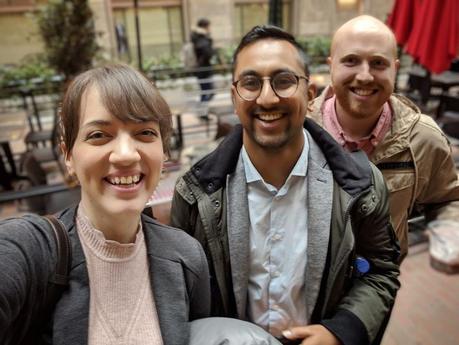My co-founders and I started our company with little common ground aside from our shared passion for inclusion and a commitment to making the world a better place. While co-founders are often friends, colleagues from a previous job, or even family, we were strangers – and we signed our incorporation documents just two months after we first met.
It’s been over a year since we went full-time on Crescendo, and the single most repeated piece of wisdom I’ve heard has been that most startups fail because of poor team dynamic. Many early-stage startup failures can be traced back to the founders having different values, discovering they don’t work well together, or having disputes about who “gets” to be the CEO (I’ve personally witnessed at least three early companies go down on this argument alone). Every team will of course have its own challenges, but the best teams can work through tough times and come out stronger on the other end. Our team has been able to work through a lot, and I attribute our strong foundation of trust to the eight months we spent living together.
Three key aspects of our founder dynamic: trust, compassion, and shared core values.
In November 2017, Stefan, Tuba, and I met at the selection weekend for Next 36, a founder-focused incubator-style program that takes an academic approach to teaching entrepreneurial skills. As part of the program, we and the other selected members of Next 36 would be moving in together to student residences at University of Toronto the following May – but rather than separate and live with other members of our cohort, we decided to room together. That’s how we found ourselves living in a tiny three-bedroom apartment in the middle of a sweltering Toronto summer.
Us in our tiny student apartment at University of Toronto (Left to right: Tuba, me, and Stefan)Later, when we moved to Montreal for Techstars, we decided to live together once again (this time in a way over-sold Airbnb where the doorframes were definitely not built with us 5’10+ people in mind):
Usually when we tell people we lived together, we’re met with a mix of surprise, laughter, and a dash of outdated gender stereotypes. So what was it really like? Living together allowed us to become friends, not just co-founders. We spent mornings and evenings together, experienced one another’s grumpy pre-coffee moods and washed each other’s dishes. We learned each other’s habits, when it’s okay to knock on doors and when to just give some space. We had mid-day and late-night brainstorms in the spur of the moment, and laid the groundwork of Crescendo with quick decisions and pivots that we could not have done so efficiently if we’d lived apart. Most importantly, we got close enough to get frustrated with each other over things big and small, and learned what we all need from each other to work issues out. Sure, it sometimes felt like Silicon Valley meets New Girl, but I think it was the key to the healthy and trusting relationship we have today.

Co-founding a company is like entering a marriage. It’s not just starting a company, it’s a decision to become a fixture in one another’s lives for the next three or more years of your lives (assuming your company survives the other trials and tribulations on the road to leaving the ‘startup’ label behind). Just like in any long-term relationship, you’ll be with your co-founders through life’s biggest ups and downs – Tuba and Stefan were there for me when my mom passed away, and played a big role in lifting me out of that hard time. You need to be able to trust each other with the tough decisions, to share the hard truths with one another openly and honestly, and to lean on each other when life throws its curveballs. It might not be everyone’s cup of startup tea, but for us, living together cemented our relationship and gave us a strong foundation from which to grow our team.
. . . . . . .


